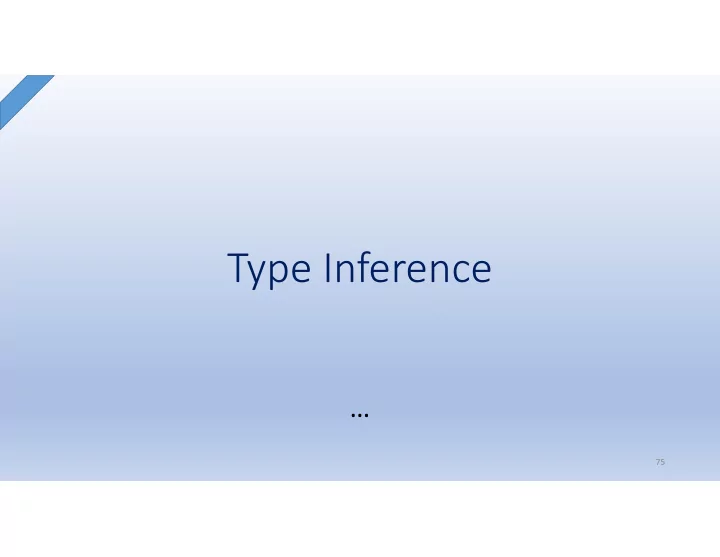

Type Inference … 75
Definition – Type Inference Type inference = Java compiler's ability • To look at each method invocation + corresponding declaration • In order to determine the type argument (or arguments) that make the invocation applicable To do this, we use a Type Inference Algorithm… 76
Definition – Inference Algorithm • determines the types of the arguments and, if available, the type of the result being assigned, or returned • tries to find the most specific type that works with all of the arguments ? If we didn’t try for most specific, Why “most specific type” everything would be Object ☺ 77
Type Inference on Generic Methods Invocations Generally, Java compiler can infer type parameters of generic method calls so you do not have to specify them Specify type parameter w/ type witness / Explicit Type Parameter as follows; BoxDemo.<Integer>addBox(Integer.valueOf(10), myIntBoxes); …or let it be inferred from method's arguments BoxDemo.addBox(Integer.valueOf(20), myIntBoxes); Similarly… 78
Type Inference on Constructors Invocations Consider the following variable declaration: Map<String, List<String>> myMap = new HashMap<String, List<String>>(); You may substitute the parameterized type of the constructor with an empty set of type parameters (<>): Map<String, List<String>> myMap = new HashMap<>(); However, remember, you may not omit the <> Map<String, List<String>> myMap = new HashMap(); // unchecked conversion warning n.b. even though it worked w/ gen methods 79
Let’s look at type inference on a constructor The compiler infers formal type parameter T = String class MyClass<X> { <T> MyClass(T t) { // ... constructor } contains a formal } type parameter T creates an instance of the Consider the following instantiation parameterized type of the class MyClass: MyClass<Integer> MyClass obj = specifies the explicit parameter new MyClass<Integer>(""); type Integer for the formal type parameter X of generic class MyClass<X> 80
Target Types - Definition Java compiler takes advantage of target typing to infer type parameters of a generic method invocation target type of an expression • = data type that Java compiler expects Expected type depends on… • where the expression appears • i.e. its context 81
Example – emptyList(…) static <T> List<T> emptyList(); // Approach #1 - using a type witness to specify T List<String> listOne = Collections.<String>emptyList(); // Approach #2 – Relying on type inference List<String> listOne = Collections.emptyList(); • statement expects instance of List<String> • This is our target type • Because emptyList(…) returns List<T>, then T must be String 82
Another example… void processStringList(List<String> stringList) { // process stringList } Suppose we want to invoke it w/ an empty list processStringList(Collections.emptyList()); static <T> List<T> emptyList(); 83
Let’s try this with Java SE 7 We get compiler error message List<Object> cannot be converted to List<String> Why? • The compiler requires a value for the type argument T • It starts assuming “Object” • Consequently, Collections.emptyList returns value of type List<Object> • This is incompatible with the method processStringList which expects List<String> Solution = specify type argument processStringList(Collections.<String>emptyList()); 84
What about Java SE 8? no longer necessary to do so processStringList(Collections.emptyList()); Why? • The notion of target type has been expanded to include method arguments Here is what happens… • processStringList requires an argument of type List<String> • method Collections.emptyList returns a value of List<T> • Using target type List<String>, compiler infers type argument T = String 85
Recommend
More recommend